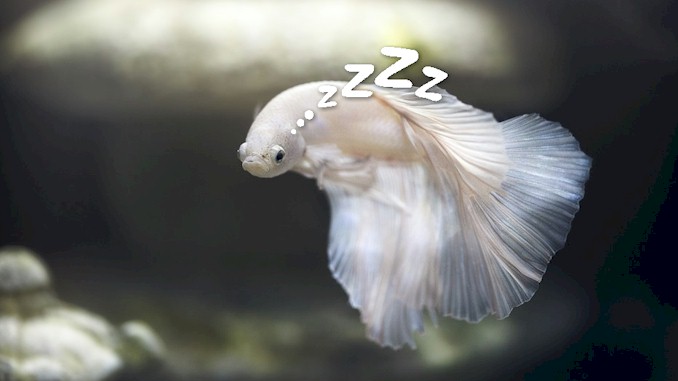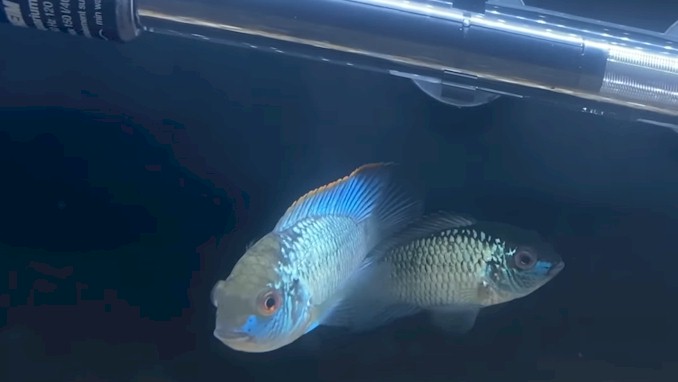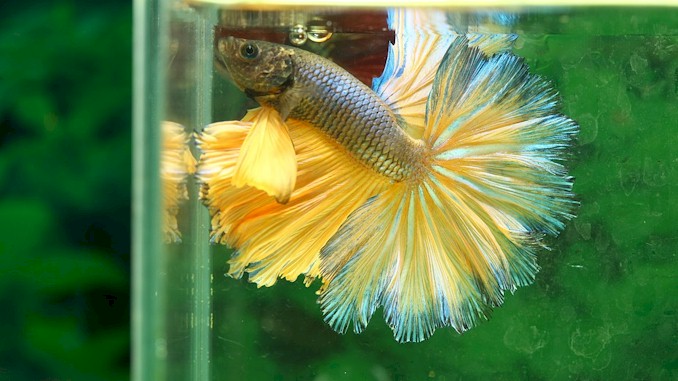Do Betta Fish Sleep (Everything You Want to Know)
Betta fish, also known as Siamese fighting fish, are a highly sought-after species in the world of aquariums. With their vibrant colors and graceful movements, it’s no wonder why they have captured the hearts of fish enthusiasts around the globe. However, have you ever wondered if these active swimmers ever take a break to rest and recharge? It’s a common question among betta fish owners – do betta fish sleep?
Betta fish do sleep, but not in the same way as humans or other mammals. They do not have eyelids, so they cannot close their eyes. Instead, they enter a state of reduced activity and awareness, where they slow down their breathing and metabolism. This state is similar to what is known as “resting” or “napping” in other fish.
As you see, betta fish do sleep. But if you want to know more about how sleep affects your bettas’ healthy and well-being and what you can do to make them have a good sleep. You won’t stop there. Here, I will share all of the information and knowledge I have learned with you, so read on and find out:
What is the Importance of Sleep for Betta Fish Health and Well-being?
Sleep is essential for betta fish’s health and well-being. Sleep allows betta fish to rest and recover from their daily activities and stress. Sleep also helps betta fish to maintain their immune system, metabolism, memory, and learning abilities. Sleep can influence betta fish’s health and well-being in various ways.
Whether or not your bettas have a good sleep will affect their growth and development. Betta fish grow and develop throughout their lifespan, but especially during their juvenile stage. During this stage, betta fish need adequate sleep to support their growth and development of their body and organs. Sleep also helps betta fish to produce hormones that regulate their growth and development. If betta fish do not get enough sleep, they might experience stunted growth or delayed development.
And, it can affect their mood and behavior. Betta fish have different personalities and temperaments that affect their mood and behavior. Betta fish also have emotions and feelings that can be influenced by their environment and experiences. Sleep can help betta fish to regulate their mood and behavior by reducing stress and anxiety. Sleep also helps betta fish to cope with negative emotions and feelings by enhancing their positive emotions and feelings. If betta fish do not get enough sleep, they might experience mood swings or behavioral problems.
Another thing you should know is that sleep can influence their disease resistance and longevity. Betta fish are susceptible to various diseases and infections that can harm their health and shorten their lifespan. Sleep can help betta fish to prevent or fight off diseases and infections by boosting their immune system. Sleep also helps betta fish to repair any damage or injury that they might have suffered during the day. If betta fish do not get enough sleep, they might become more vulnerable or prone to diseases and infections.
As you can see, sleep can influence betta fish’s health and well-being in various ways. Sleep is vital for betta fish’s growth and development, mood and behavior, disease resistance and longevity. Therefore, it is important to provide your betta fish with enough sleep to ensure their health and well-being.
When Do Betta Fish Sleep
Betta fish do not have a fixed sleep schedule like humans do. They can sleep at any time of the day or night, depending on their environment and individual preferences. However, there are some factors that influence when betta fish are more likely to sleep.
One factor is the light cycle. Betta fish are diurnal animals, which means they are active during the day and rest at night. They use the natural or artificial light in their tank to regulate their circadian rhythm, which is their internal biological clock. If the light in their tank is too bright or too dark, it can disrupt their normal sleep pattern and cause stress. Therefore, it is important to provide your betta fish with a consistent light cycle that mimics the natural day and night cycle. A good rule of thumb is to keep the light on for 10 to 12 hours a day and turn it off for the rest of the time.
Another factor is the temperature. Betta fish are tropical fish that prefer warm water temperatures between 76 and 82 degrees Fahrenheit. If the water temperature is too low or too high, it can affect their metabolism and energy levels. When the water temperature is low, betta fish tend to become less active and more sleepy. When the water temperature is high, betta fish tend to become more active and less sleepy. Therefore, it is important to maintain a stable and optimal water temperature for your betta fish by using a heater and a thermometer.
A third factor is the personality. Betta fish have different personalities and temperaments that affect their behavior and sleep habits. Some betta fish are more energetic and curious, while others are more calm and shy. Some betta fish are more aggressive and territorial, while others are more peaceful and friendly. These traits can influence how much and when betta fish sleep. For example, a more aggressive betta fish might sleep less because it is always on guard for potential threats or rivals. A more peaceful betta fish might sleep more because it feels safe and relaxed in its environment.
As you can see, there is no definitive answer to when betta fish sleep. It depends on various factors that vary from one betta fish to another. The best way to find out when your betta fish sleeps is to observe its behavior and patterns over time. You might notice that your betta fish sleeps more or less during certain times of the day or night, or that it has a favorite spot or position to sleep in. By paying attention to these details, you can learn more about your betta fish’s personality and needs.
How to Tell if Your Betta Fish is Sleeping?
Betta fish do not have eyelids, so they cannot close their eyes when they sleep. This can make it hard to tell if they are sleeping or awake. However, there are some signs and clues that can help you figure out if your betta fish is sleeping.
The first sign or clue you should pay attention to is your bettas’ body posture. Betta fish often relax their muscles and fins during sleeping and assume a more horizontal stance. Moreover, they could have a little head tilt downward or upward. To feel safer and more at ease, they could even hide behind plants, decorations, or in caves. Betta fish often swim around the tank and investigate their environment when they are awake. To display their colors and patterns, they may also stretch their fins and flare their gills.
The second one you should pay attention to is the pace of breathing of your betas. When betta fish sleep, they slow down their breathing and metabolism to conserve energy. They might also rise to the surface of the water to gulp some air from time to time. This is because betta fish have a special organ called the labyrinth that allows them to breathe atmospheric oxygen as well as dissolved oxygen in the water. When betta fish are awake, they breathe more frequently and vigorously to support their activity and movement.
A third one is the responsiveness. When betta fish sleep, they are less aware of their environment and less responsive to stimuli. They might not react to sounds, lights, or movements in or outside the tank. They might also ignore food or treats that are offered to them. When betta fish are awake, they are more alert and curious about their environment and more responsive to stimuli. They might react to sounds, lights, or movements in or outside the tank. They might also show interest in food or treats that are offered to them.
All these signs can help you tell if your betta fish is sleeping or awake. However, keep in mind that these signs are not always reliable or consistent. Some betta fish might sleep more lightly or deeply than others. Some betta fish might sleep at different times of the day or night than others. Some betta fish might have different sleeping habits or preferences than others. Therefore, it is important to observe your betta fish regularly and get to know its individual behavior and personality.
How Long Do Betta Fish Sleep?
Betta fish do not have a fixed sleep duration like humans do. They can sleep for as long or as short as they need, depending on their environment and individual preferences. However, there are some factors that influence how long betta fish sleep.
One factor is the light cycle. As mentioned earlier, betta fish are diurnal animals that follow the natural or artificial light cycle in their tank. They tend to sleep more during the night and less during the day. However, this does not mean that they sleep for the entire night or stay awake for the entire day. Betta fish can sleep for short periods of time throughout the day or night, depending on their mood and energy levels. A typical betta fish might sleep for about 6 to 8 hours a day, but this can vary from one betta fish to another.
Another factor is the temperature. As mentioned earlier, betta fish are tropical fish that prefer warm water temperatures between 76 and 82 degrees Fahrenheit. If the water temperature is too low or too high, it can affect their metabolism and energy levels. When the water temperature is low, betta fish tend to become less active and more sleepy. They might sleep for longer periods of time or more frequently. When the water temperature is high, betta fish tend to become more active and less sleepy. They might sleep for shorter periods of time or less frequently.
A third factor is the personality. As mentioned earlier, betta fish have different personalities and temperaments that affect their behavior and sleep habits. Some betta fish are more energetic and curious, while others are more calm and shy. Some betta fish are more aggressive and territorial, while others are more peaceful and friendly. These traits can influence how long betta fish sleep. For example, a more energetic betta fish might sleep less because it is always ready to explore and play. A more calm betta fish might sleep more because it enjoys relaxing and resting.
As you can see, there is no definitive answer to how long betta fish sleep. It depends on various factors that vary from one betta fish to another. The best way to find out how long your betta fish sleeps is to observe its behavior and patterns over time. You might notice that your betta fish sleeps more or less during certain times of the day or night, or that it has a regular or irregular sleep schedule. By paying attention to these details, you can learn more about your betta fish’s personality and needs.
How to Provide Your Betta Fish with a Good Sleeping Environment?
Betta fish sleep better when they feel comfortable and secure in their environment. Therefore, it is important to provide your betta fish with a good sleeping environment that meets their needs and preferences. Here, I am going to share with you about what you can do to provide your bettas with a good sleeping environment.
One thing you can do is to provide your betta fish with a consistent light cycle that mimics the natural day and night cycle. As mentioned earlier, betta fish are diurnal animals that use the light in their tank to regulate their circadian rhythm. If the light in their tank is too bright or too dark, it can disrupt their normal sleep pattern and cause stress. Therefore, it is important to provide your betta fish with a consistent light cycle that mimics the natural day and night cycle. A good rule of thumb is to keep the light on for 10 to 12 hours a day and turn it off for the rest of the time. You can use a timer or a dimmer to automate this process.
Another thing you can do is to maintain a stable and optimal water temperature for your betta fish by using a heater and a thermometer. As mentioned earlier, betta fish are tropical fish that prefer warm water temperatures between 76 and 82 degrees Fahrenheit. If the water temperature is too low or too high, it can affect their metabolism and energy levels. When the water temperature is low, betta fish tend to become less active and more sleepy. When the water temperature is high, betta fish tend to become more active and less sleepy. Therefore, it is important to maintain a stable and optimal water temperature for your betta fish by using a heater and a thermometer. You should check the water temperature regularly and adjust it as needed.
And, you can also provide your betta fish with some hiding places and decorations in their tank. Betta fish like to have some privacy and security when they sleep. They might also like to have some variety and stimulation in their environment. Therefore, it is important to provide your betta fish with some hiding places and decorations in their tank. You can use plants, rocks, caves, driftwood, or other ornaments that suit your betta fish’s personality and style. You should also make sure that these items are safe and clean for your betta fish.
While you have implemented all the things mentioned above, you can give your betta fish a good sleeping environment that meets their needs and preferences, and you can help your betta fish sleep better and live happier.
What Not to Do If Your Betta is Sleeping
Betta fish sleep better when they are left alone and undisturbed. Therefore, it is important to avoid doing anything that might wake them up or stress them out when they are sleeping. Here are some things that you should not do if your betta is sleeping:
1. Tap the side of the aquarium
While it might seem like an innocent way to interact with your betta fish, tapping on the glass or shaking the tank can actually be detrimental to their well-being. Such actions can cause vibrations and noises that can startle and disturb your betta, especially when it is sleeping. It can also create a sense of insecurity and threat, which can impact their overall health and happiness.
Therefore, it’s crucial to avoid tapping on the glass or shaking the tank when your betta is sleeping. Instead, it’s best to let them rest and maintain a peaceful environment in their tank. By respecting your betta’s need for rest and relaxation, you can help ensure their overall well-being and happiness. So, resist the temptation to tap on the glass or shake the tank and allow your betta to have a good night’s sleep.
2. Leave the tank lights on 24/7
If you’re a first-time fish owner, it’s natural to wonder about the amount of light your Betta fish needs. The specific lighting requirements of your Betta fish can depend on its particular species. Typically, Betta fish are active during the day and rest at night, so it’s recommended to establish a consistent lighting schedule using a timer.
Ideally, Betta fish should receive around 8 hours of light per day, but you can increase the duration up to 12 hours without adverse effects. However, exposing your Betta fish to 24-hour light can elevate the water temperature and interfere with their sleep cycle.
Creating a set lighting schedule can help your Betta fish distinguish between night and day, resulting in a more comfortable sleeping pattern. As your Betta fish ages, it may require more sleep, which may require adjusting the lighting in your aquarium to accommodate the evolving sleep patterns of your fish.
3. Turn the lights on and off abruptly
As previously mentioned, the lighting in your betta fish tank plays a vital role in regulating their circadian rhythm. Abruptly turning the light on or off can potentially confuse their internal biological clock, resulting in a disrupted sleep pattern. Moreover, sudden changes in lighting can cause undue stress and discomfort for your betta.
To avoid disrupting your betta’s sleep and minimizing their discomfort, it’s best not to turn the light on or off abruptly while they are sleeping. By maintaining a consistent lighting schedule, you can help your betta establish a healthy sleep pattern and prevent any undue stress or discomfort. It’s essential to prioritize the well-being of your betta fish and ensure their sleep is not disrupted by sudden changes in light.
4. Feed your betta or change the water when it is sleeping
Maintaining a healthy and happy betta fish requires a consistent feeding schedule and clean water conditions. However, disrupting your betta’s sleep to feed them or change the water can do more harm than good. Feeding your betta when it is sleeping can cause overeating or choking on food, which can be harmful to their health. Similarly, changing the water while your betta is sleeping can cause sudden changes in temperature, pH levels, or water chemistry, leading to shock or stress.
To prevent any harm to your betta, avoid feeding or changing the water when it is sleeping. It’s essential to respect your betta’s sleep schedule and ensure that it is not disturbed unnecessarily. Instead, plan your feeding and water change schedule around your betta’s active periods during the day. By prioritizing the well-being of your betta fish, you can ensure they remain healthy and happy for years to come.
5. Poke the fish to see if it is dead or just sleeping
Have you ever noticed your fish floating in one spot without any movement? It’s common for fish keepers to panic and assume the worst, thinking that their fish may be dead. However, it’s important not to poke or prod the fish to see if it moves, as this can startle and potentially harm them.
Instead, give your fish some time and space to see if it begins to move naturally. Often, fish may simply be resting or in a period of reduced activity. By waiting patiently, you can avoid causing unnecessary stress or harm to your fish. If you’re still concerned after giving your fish time to rest, it’s best to consult with a veterinarian or fish expert to determine if there may be an underlying health issue.
In summary, resist the urge to poke or prod your fish if it appears inactive. Be patient and observant, and if you’re still worried, seek professional advice. With proper care and attention, you can help ensure the health and happiness of your fish.
Related Questions:
Do betta fish hibernate? Betta fish do not hibernate in the traditional sense. While they may become less active in colder water, they do not undergo a true hibernation period. Instead, they have a natural sleeping pattern that allows them to rest and conserve energy. It is important to maintain a stable water temperature for betta fish, as significant changes in temperature can be harmful and disrupt their sleeping patterns.
How many hours do betta fish sleep? Betta fish typically sleep for around 8 hours per day, although this can vary depending on the individual fish and their environment. It is important to provide a consistent day/night cycle and a peaceful sleeping environment for betta fish to ensure they get adequate rest. It is also important to avoid disturbing or startling your betta fish during their sleep, as this can lead to stress and disruption of their natural sleep pattern.
Do betta sleep with the light on? Betta fish prefer to sleep in the dark as they use light to regulate their circadian rhythm. Sleeping with the light on can disrupt their sleep patterns and cause stress, leading to health problems over time. It is recommended to turn off the lights in the tank during the night to provide a comfortable sleeping environment for your betta.
Do betta fish sleep at the top of the tank? Betta fish can sleep anywhere in the tank, including the top, middle, or bottom. However, they may choose to sleep at the top of the tank because it’s closer to the surface, where they can take in air. If your betta is consistently sleeping at the top of the tank, it could be a sign of poor water quality or oxygen levels.







